Today we’ll be chatting about our summer book pick, Don’t Let’s Go to the Dogs Tonight: An African Childhood by Alexandra Fuller. Like last time, we each wrote our thoughts below, just thinking about what stood out to us when reading the book and commenting on each other’s posting. We hope this format isn’t too difficult to read and respond to, as we would like to continue the discussion in the comments throughout the day.
Fair warning, this discussion (and probably many of the comments) will have *SPOILERS* so please don’t read this post if you haven’t finished the book yet. After you’re done, feel free to revisit this post and share your thoughts with us. If you have finished, why not join us in reading Fuller’s follow up – Cocktail Hour Under the Tree of Forgetfulness and if you can’t get enough, here’s a great book talk with Fuller.
Katie here: Wow, Sarah’s thoughts below are a beautiful reflection on the book. Leaving me slightly speechless and stumbling over my words… I’ve added a few comments between her paragraphs, but I didn’t want to break the flow too much.
Sarah’s thoughts:
I think the best way to describe Alexandra Fuller’s memoir, Don’t Let’s Go to the Dogs Tonight, is raw. It is an unsentimental look into the lives of a white farming family settling in a civil-waring Rhodesia. Fuller’s writing is unapologetic and unflinchingly true. I didn’t feel comfortable too often while reading this book and in the end that is why I liked it so much. I guess I expected more of a liberal confession of past events, but because it is written in a child’s perspective that is all bypassed. Instead we are left with an unpretentious look at what it is truly like to grow up on the losing side of an anti-colonial war. Don’t Let’s Go to the Dogs Tonight is not only about race, war and poverty, but also about tough family situations like losing a sibling (or three), having an alcoholic mother and living in hardship. Even though this is an ardent memoir, there are moments in Fuller’s young life that you can’t help, but want to be a part of.
The way she describes the scenes, sounds and smells of Africa draw the reader into a state of envy. Even though Fuller’s African childhood was unforgiving, it was brimming with rare experiences that I really appreciated reading and learning more about. Her writing is so descriptive that I honestly felt transported to Africa, a place I have never visited. If you know me, you know that my favorite thing to do is travel. I know a lot of people say that, but I feel SO alive when I travel and whenever I’m not traveling, I kind of just feel like it’s a break between trips. This book felt like traveling to me. Fuller painted a picture of a landscape that is completely foreign to me, but after reading her descriptions like “an explosion of day birds…a crashing of wings” and “The clouds that form this stolen earth-plant water scud north and south, torn by hot wind, and are left scattered like a thin white scarf across the sky.” Also how she describes Africa to “black tea, cut tobacco, fresh fire, old sweat, young grass.” I now feel acquainted with southern Africa.
Katie here : I’m glad you felt transported, I did too, and that’s exactly what I was hoping for when picking these books! I didn’t think about it until I read your comments, but I completely agree that by sharing the rare experiences that are foreign to us and even beyond our comfort zone, that really creates the sense of travel. At the same time, there are similar experiences that I can relate to, and that make it so easy for me to start to paint a picture and then fill in the details. Specifically when she describes going to the bathroom in the middle of the night with just the flame of a candle for light and being scared for the scorpions and other creatures. I immediately thought about going to the outhouses at summer camp with just a flashlight and being just as afraid of the unknown creatures in the dark. In addition to her descriptions of the place and smells, I think that the way she uses language adds to our understanding of this foreign landscape. It’s small things, but using “ja ja” (in place of “yeah”), “fergodsake”, “man”, and “loo” are a few examples I remember.
Here is an excerpt from a 2004 interview with Barnes & Noble that speaks to her specificity.
“I have come to the conclusion that I can only write about something if I have actually smelled it for myself. I have no idea what this says about me, but I think it’s a fact of my work. I also cannot think of something without immediately evoking its smell (for example, if I think of my father, I think of the smell of cigarette smoke and the bitter scent of his sweat – he has never once worn deodorant, so his smell is very organic and wonderfully his – and of the faint aroma of tea and engine oil he exudes). Once in France, a particularly thorough journalist (he has 50 questions for me!) said, somewhat accusingly, ‘You have written here in your book’ (it was Don’t Let’s Go to the Dogs Tonight) ‘about the smell of frog sperm. What exactly does frog sperm smell of?’ And without hesitating for a moment, I replied, ‘Cut turnips,’ which I think surprised both of us.”
Katie here: Yes! I’m glad you mentioned her reference to smells – it was something that popped off the pages for me! I find myself often thinking in smells (take my intro to the fresh mint ice cream). And just the other day I told Calder that I will miss the smell of Alex’s wet diapers first thing in the morning when they are full and warm from the night before. I know it sounds crazy. I can’t find the page, but at one point Fuller mentions the smell of Olivia’s “wet nappy”, and I knew exactly what she meant.
Just like our last book pick, Where’d You Go, Bernadette? the story is written from a young person’s point of view. I appreciate the over-simplification of complex race relations in this memoir. It leaves the reader to focus on what lays beneath all wars: families. It’s not black Africans vs. white Africans in this book, it’s individuals leading lives that are complicated by the clashes of war. Instead of focusing on the history of Africa and objective viewpoints (which would be seemingly impossible) the reader is able to focus on one family’s experience at the epicenter of a civil war. This book is not a lot of things, but it is an extremely personal story that delves into all aspects of growing up in a white farming family, which was extremely interesting to me. It was also refreshing to not focus on the fighting and hardships page after page. Reading about certain instances like the Christmas rum cake exploding and the visit from the two missionaries (that were chased off by the family’s flea-ridden dogs) bridged the gap between Fuller’s family and my own. We all have strange stories that are interesting and funny, even if you grew up on the losing side of a civil war.
Katie here : I couldn’t agree more. There’s something about having this written from the child’s perspective that makes such heavy topics easier to read.
At times, reading about Fuller’s family was tough. Her mother’s struggles were so overbearing that it made my heart ache for the entire family. Fuller’s childhood was less than ideal, which makes for good reading, but like she says in the book, ‘geeze man’ that must have been rough. This book made me grateful for my parents who are both seemingly perfect to me. I could not imagine having to grow up in the Fuller household. I’m positive I’d be a little more than damaged from all that. On that same note, I’ve been thinking a lot about family dynamics lately and the roles of different siblings. While I was reading Don’t Let’s Go to the Dogs Tonight, I was often thinking about Vanessa and what she must have been feeling and dealing with during her own childhood. Did you catch yourself thinking about Van a lot too? I can’t help but feel that it must have been harder to be older and so aware of all the internal family turmoil. I’m also not a parent, but I imagine if you’re a mother reading this book, the death of three of five children is unfathomable. It made me wonder why Fuller’s parents continued to live in such a harsh and unwelcoming environment. The only thing I came up with was that it felt like home. Sometimes no matter how many forces are repelling you, you are still attracted to a certain place and for the Fullers that place was southern Africa.
Katie here : Again, I completely agree. At times it is so hard to read, but somehow knowing that she was now writing this as an adult gave me some peace. Knowing that at the end of the book, she lives through this and thrives (my assumption, but given the quality of her writing, I think she’s come out okay on the other end). Towards the end of the book, particularly after Richard died, I was really worried for her family, thinking that the fire inside them had died, but then when we get to the scene of her wedding that was full of antics and alcohol and went on for days, I realized that they were still alive and kicking. I did find myself wanting to hear more from Van, but at the same time I agree that it must have been hard for her being the older child and having a better understanding of what was going on, and so her perspective might have less colorful.
Another thing that really grabbed me while reading this book was all of the family portraits. I wonder how my perception of the people and places would be different if the photos weren’t there? It was something I anticipated at the start of each chapter and even found myself flipping back and forth through the book to look at all of the photos of a particular family member when they were the focus of a story.
After hearing what we had to say, (and there were many more topics we could have discussed) what stood out to you? We love hearing what others take away from the book because Katie and I often think the same things (or VERY similar) so other points of view are refreshing! If you read the comments of our last book pick, you’ll see some readers had very different views and we loved hearing about them, so please share! Also, here are some other points we thought were worth thinking about:
- Given their dangerous surroundings in Zimbabwe, Malawi, and Zambia and a long streak of what young Bobo describes as “bad, bad luck,” why do you think the Fuller family remains in Africa?
- What do you think of Fuller’s mother and father? How would you describe them? Do you think they were good parents?
- Fuller describes the family’s move to Burma Valley as landing them “right [in] the middle, the very birthplace and epicenter, of the civil war in Rhodesia.” Do you think her youthful impressions give a realistic portrait of the violent conflict?
- Animals are ever present in the book. How do the Fullers view their domesticated animals, as compared to the wild creatures that populate their world?
- Consider Fuller’s interactions with black Africans, including her nanny in Rhodesia and the children she plays “boss and boys” with, as well as with Cephas the tracker and, later, the first black African to invite her into his home. Over the course of Don’t Let’s Go to the Dogs Tonight, how does the narrator change and grow?
- By the end of the narrative, how do you think the author feels about Africa? Has the book changed your own perceptions about this part of the world?
- Fuller works very hard to maintain a view of southern Africa from a child’s perspective. Would you rather know the history of those years from the inside out, through her eyes, or know something in advance from an authoritative, “objective” view?
- The back cover calls the book “unsentimental and unflinching”. This is especially true of her description of the racial attitudes of white settlers: she does not apologize for them nor explains them away, but neither does she justify or excuse them. Do you find this this unsettling or do you appreciate the honesty. How do you react to this choice?

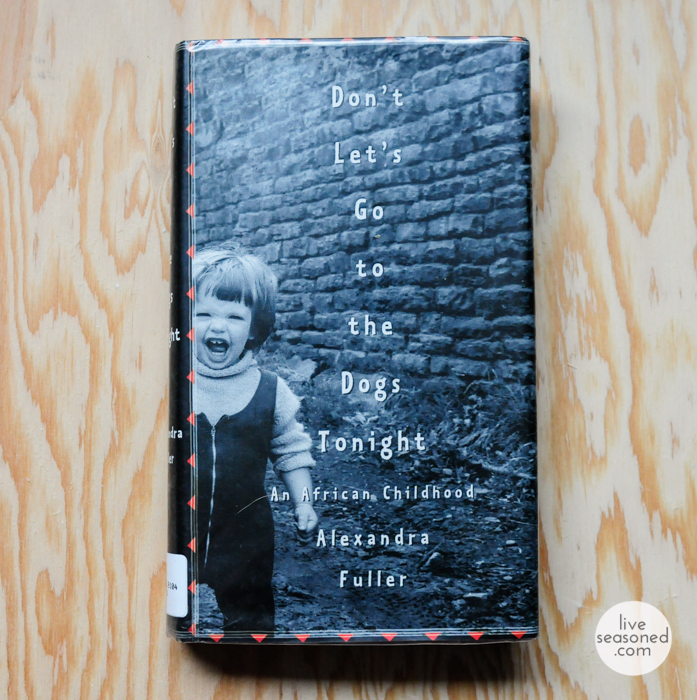
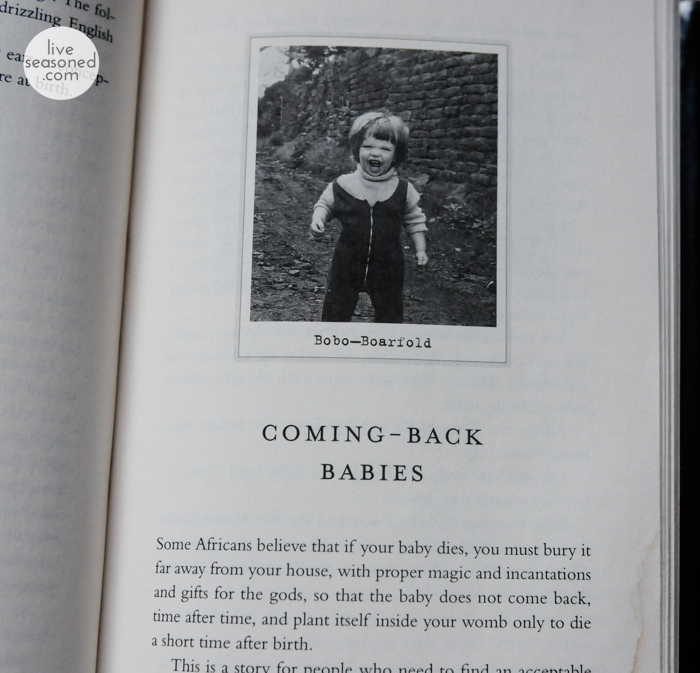
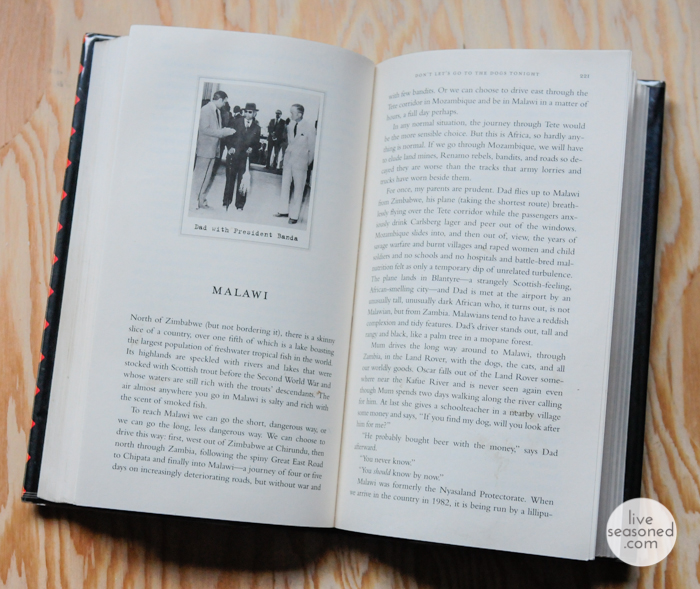
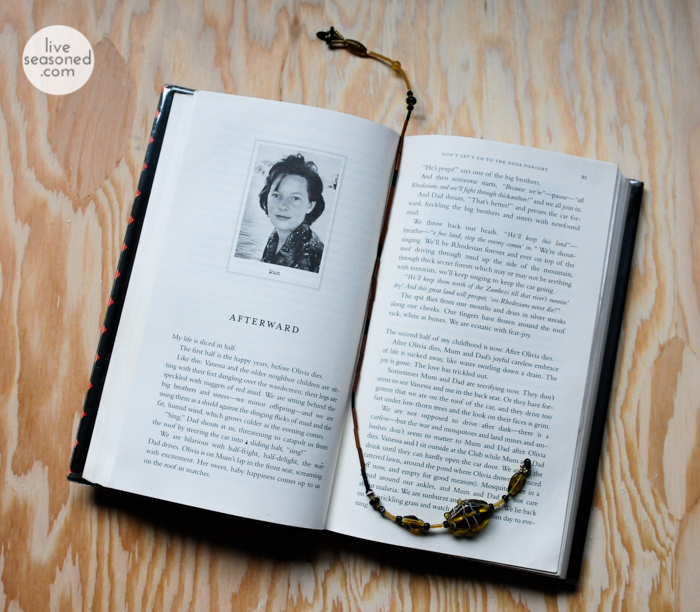
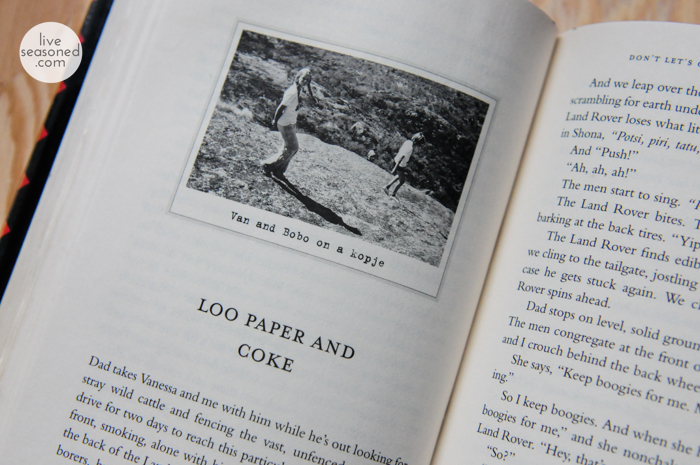
of course I lost my copy of this book as soon as it came in the mail! luckily i just found it and will race through it so i’m not behind, xoxxo
goody, goody!
Just some observations and thoughts, nothing too heavy:
It’s hard to imagine rearing my children in such a harsh environment, especially subjecting them to the disease and illness. Even though I have not lost children, I have lost relatives before their time, that has always stayed with me. I can understand how hard it is for the mother to cope and retreat into her ” crazy” times. I also can understand how she pulls herself out in order to go on.
Not living in that culture, the parents seem a bit irresponsible towards making decisions for their family.
I am also amazed when I read of life in different cultures where the family seems lower than middle class, but still has cooks and servants to take care of the house.